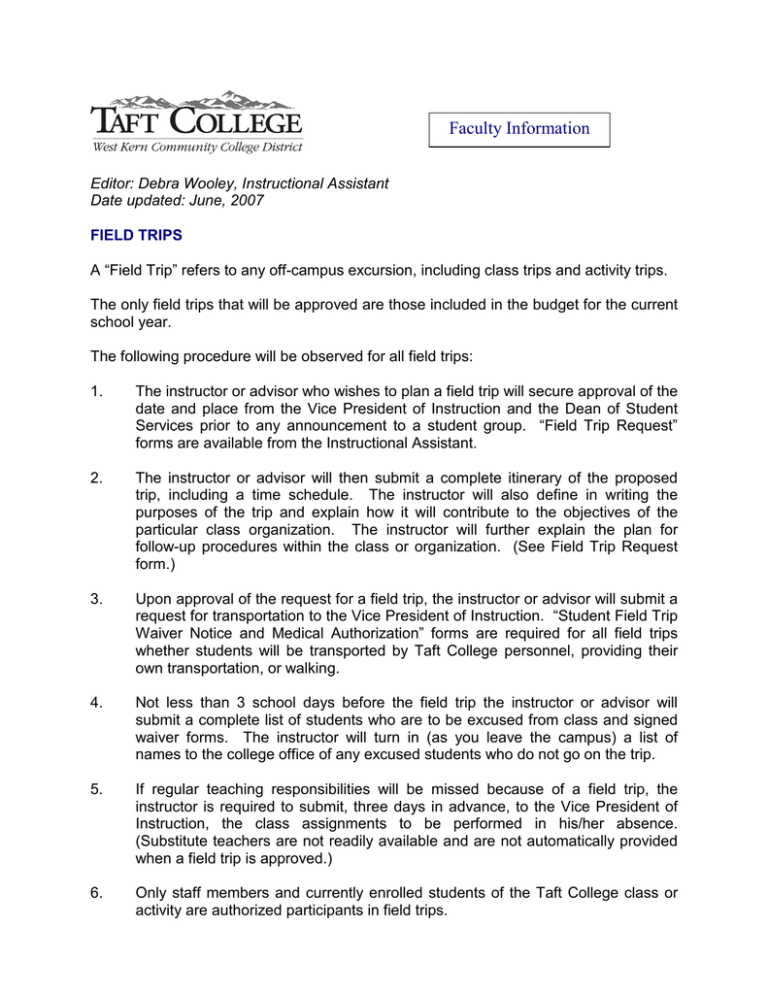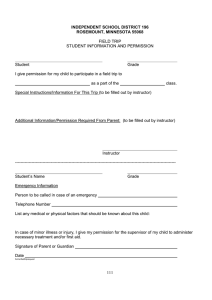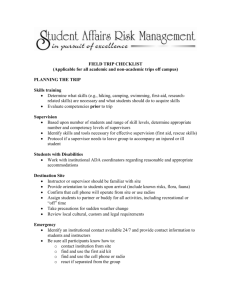Faculty Information
advertisement

Faculty Information Editor: Debra Wooley, Instructional Assistant Date updated: June, 2007 FIELD TRIPS A “Field Trip” refers to any off-campus excursion, including class trips and activity trips. The only field trips that will be approved are those included in the budget for the current school year. The following procedure will be observed for all field trips: 1. The instructor or advisor who wishes to plan a field trip will secure approval of the date and place from the Vice President of Instruction and the Dean of Student Services prior to any announcement to a student group. “Field Trip Request” forms are available from the Instructional Assistant. 2. The instructor or advisor will then submit a complete itinerary of the proposed trip, including a time schedule. The instructor will also define in writing the purposes of the trip and explain how it will contribute to the objectives of the particular class organization. The instructor will further explain the plan for follow-up procedures within the class or organization. (See Field Trip Request form.) 3. Upon approval of the request for a field trip, the instructor or advisor will submit a request for transportation to the Vice President of Instruction. “Student Field Trip Waiver Notice and Medical Authorization” forms are required for all field trips whether students will be transported by Taft College personnel, providing their own transportation, or walking. 4. Not less than 3 school days before the field trip the instructor or advisor will submit a complete list of students who are to be excused from class and signed waiver forms. The instructor will turn in (as you leave the campus) a list of names to the college office of any excused students who do not go on the trip. 5. If regular teaching responsibilities will be missed because of a field trip, the instructor is required to submit, three days in advance, to the Vice President of Instruction, the class assignments to be performed in his/her absence. (Substitute teachers are not readily available and are not automatically provided when a field trip is approved.) 6. Only staff members and currently enrolled students of the Taft College class or activity are authorized participants in field trips. 7. It will be the responsibility of the instructor or advisor to be certain that drivers of district vehicles are properly licensed. FIRST AID EQUIPMENT REQUIRED ON FIELD TRIPS 1. Section 32040 of the Education Code provides that the governing board of any school district or community college district, superintendent of schools, or principal in whom is vested the administration or supervision of any public or private school in the state shall equip the school with a first aid kit, whenever any pupils of the school are conducted or taken on field trips under the supervision or direction of any teacher in, or employee or agent of, the school. 2. Section 32041. The teacher, instructor agent, or employee shall have the first aid kit in his/her possession, or immediately available, while conducting the field trip. 3. Section 32043. Whenever a field trip is conducted into an area which is commonly known to be infested by poisonous snakes, the first aid kit may include a snakebite kit. Any first aid kit or snakebite kit taken into an area which is commonly known to be infested by poisonous snakes shall contain medically accepted snakebite remedies. Any field trip into an area which is commonly known to be infested by poisonous snakes that is conducted by any public or private school in the state shall be accompanied by a teacher, employee, or agent of the school who has completed a course in first aid, certified by the American Red Cross, which emphasizes the treatment of snakebites. It shall be the responsibility of the school conducting the field trip to comply with the requirements of this section and nothing in this section shall be construed as requiring the American Red Cross to provide first aid courses in any manner or location. 4. Section 32044. Any member of the governing board of any school district, any community college district and any superintendent of schools, principal, teacher, instructor or agent who willfully violates the provisions of this article (commencing at Section 32040) is guilty of a misdemeanor. EMERGENCY CARE OF PERSON WITH CONVULSIONS 1. Keep calm. The person is usually not suffering or in danger. 2. Help him/her to a safe place but DO NOT restrain his/her movements. Loosen tight clothing. 3. After jerking of seizure has subsided, and if he/she is still conscious, turn person on his/her side with his/her face gently turned downward. 4. DO NOT PUT ANYTHING BETWEEN TEETH. 5. DO NOT give him/her anything to drink. 6. Stand by until the person has fully recovered consciousness and from the convulsion which sometimes follows a seizure. 7. Let him/her rest if he/she feels tired, then encourage him/her to go about his/her regular activities. 8. If the person is a child, notify parents or other persons responsible for him/her at the time of the seizure. 9. It is rarely necessary to call public authorities. However, in case of prolonged seizures or, if a person injures himself/herself by falling, it may be wise to secure professional help.


